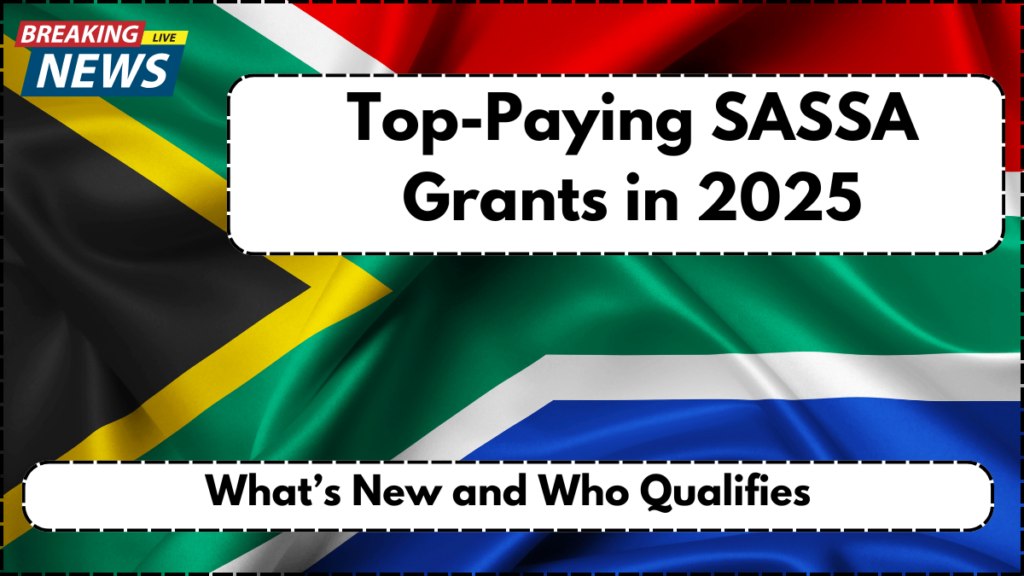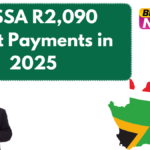As South Africa continues to confront the economic impact of inflation—currently at 5.3%—the South African Social Security Agency (SASSA) has updated its grant structures to deliver greater financial support to its most vulnerable citizens. With April 2025 ushering in revised grant values and evolving eligibility criteria, these changes aim to alleviate the strain of rising living costs and support economic stability.
This comprehensive guide explores the highest paying SASSA grants for 2025, their eligibility requirements, and the latest government efforts toward a Universal Basic Income.

Overview of SASSA Grant Adjustments for April 2025
To combat escalating financial pressure on low-income households, the South African government has increased several social grants under SASSA. Although the increments do not fully offset inflation, they represent a meaningful step forward in providing immediate financial relief. The April 2025 adjustments follow a two-phase strategy: an R90 increase this month, with a further R10 boost scheduled later in the year.
Payment methods remain flexible—beneficiaries can receive funds via direct bank deposits or through designated pay points nationwide.
Moving Toward Universal Basic Income (UBI)
A pivotal development is the ongoing transition from the Social Relief of Distress (SRD) grant toward a broader Universal Basic Income model. This shift, expected to continue through 2025, is designed to strengthen the country’s safety net and establish long-term income security for unemployed and underemployed citizens.
Updated SASSA Eligibility Criteria for 2025
To ensure fair access, each grant type is governed by specific criteria related to income, age, and individual needs:
Older Person’s Grant
-
Individuals: Annual income must not exceed R92,520.
-
Couples: Combined income must be under R185,040.
Child Support Grant
-
Monthly income limit (single applicant): R4,800
-
Monthly income limit (married couples): R9,600
Care Dependency Grant
-
Single applicants: Annual income cap of R238,800
-
Married applicants: Combined income must be below R477,600
Foster Child Grant
-
Requires a valid court order
-
Involves social worker verification
-
Subject to a means test and supporting documentation
Applicants across all categories must provide updated personal details, including proof of residence, income, and where applicable, medical records or legal documentation.
Highest Paying SASSA Grants in April 2025
The following table outlines the top-paying grants, their updated amounts, previous values, and the key qualifications required.
| Grant Type | Current Payment (2025) | Previous Payment | Eligibility Criteria |
|---|---|---|---|
| Older Person (75+) | R2,210 | R2,200 | Age 75+, income under threshold |
| Older Person (60–74) | R2,190 | R2,180 | Age 60–74, meet income requirements |
| Disability Grant | R2,190 | R2,180 | Aged 18–59, permanent disability, income-tested |
| Care Dependency Grant | R2,190 | R2,180 | Child with full-time care needs, income limits apply |
| Foster Child Grant | R1,190 | R1,140 | Requires court order, reviewed by social services |
| Child Support Grant | R750 (with top-up) | R530 (base only) | For children under 18, based on income eligibility |
Financial Relief in 2025: More Support, Yet More Needed
While the recent increases have been well-received, many argue they still lag behind the real cost of living. The modest R10 to R90 increases offer relief, especially for the elderly and caregivers, yet essential expenses like transport, food, and healthcare remain burdensome.
The Foster Child Grant saw one of the highest increases, now at R1,190. Meanwhile, the Child Support Grant increased to R530 as a base, with eligible families receiving a top-up that raises the total to R750. These boosts reflect an effort to prioritize children’s welfare and care responsibilities in low-income households.
Stay Informed: Importance of Monitoring Your Eligibility
As policy changes continue throughout 2025, grant recipients must remain proactive in checking their eligibility status. Any changes in income, household status, or medical condition can impact eligibility. Regular updates from SASSA and prompt submission of necessary documents are crucial to avoid payment interruptions.
Conclusion
The SASSA grants for April 2025 mark an important step in providing stronger financial support for millions of South Africans. While not perfect, the increases signal progress in addressing inequality and economic vulnerability. As the nation anticipates the rollout of Universal Basic Income, staying informed and engaged with SASSA processes will be key for every applicant.
FAQs
What is the current inflation rate considered in the 2025 SASSA increases?
The government based the 2025 increases on an inflation rate of approximately 5.3%, although some critics argue that the grant increases do not fully reflect actual living expenses.
Who qualifies for the highest SASSA grant in 2025?
The highest individual grant is the Older Person’s Grant for those aged 75 and above, paying R2,210 per month. Disability and Care Dependency Grants follow closely at R2,190.
Are these SASSA increases permanent?
Yes, the April 2025 increases are permanent until further government review. Additional adjustments may be announced later in the year depending on inflation trends and fiscal policy.
Can I receive more than one grant from SASSA?
In most cases, beneficiaries can only receive one grant type at a time unless applying on behalf of a child or dependent, such as receiving a Foster or Child Support Grant.
What documents are needed for a new application in 2025?
Applicants need a valid South African ID, proof of income, proof of residence, and any applicable legal or medical documents, such as court orders or doctor assessments, depending on the grant type.
For More Information Click Here
Pari is a passionate writer known for captivating stories that blend imagination and reality. Inspired by travel, history, and everyday moments, Pari crafts narratives that resonate deeply with readers.



